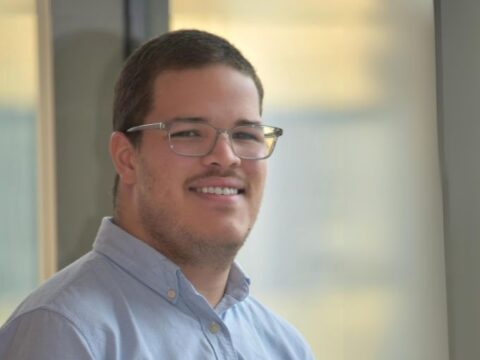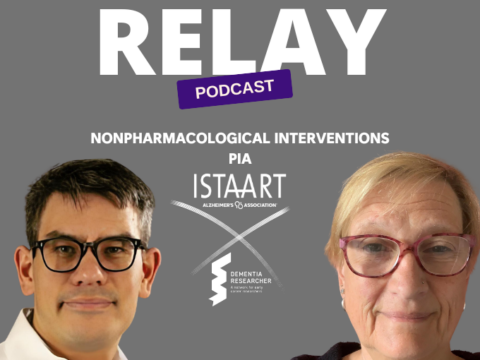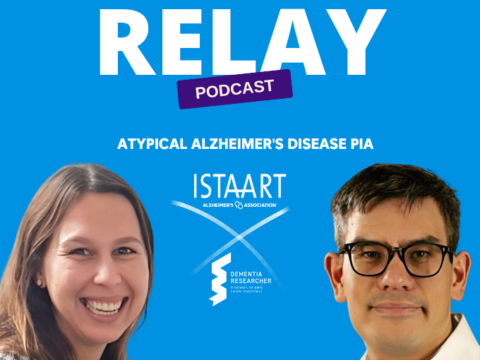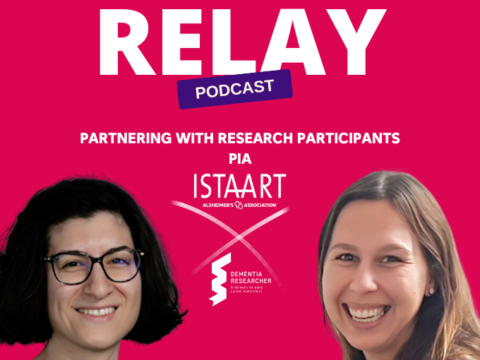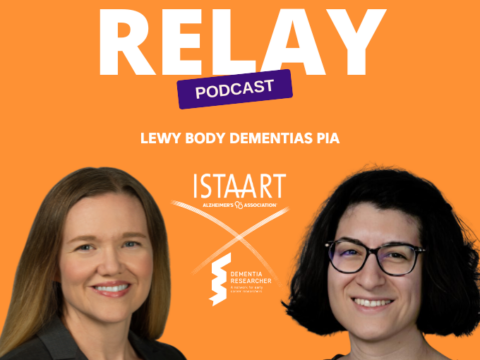The Dementia Researcher, ISTAART Relay Podcast is back for a third, 5-part series. Where the interviewee becomes the interviewer. With five leading researchers discussing their research, their field, and the work of the Alzheimer’s Association ISTAART Professional Interest Area they represent.
Part Four – Dr Louise Ince interviews Erica Dove representing the Technology and Dementia PIA.
Dr Louise Ince is a Postdoctoral Research Associate at the University of Texas at Austin. Louise’s work focuses on circadian (daily, ~24 h) rhythms in immune function: why our body’s inflammatory response varies depending upon the time-of-day. She is particularly interested in how the dynamics of neuroimmune responses change with aging and in dementia (she is also an expert in pyrotechnics, and hails from Blackpool in the north of England). Louise is representing the ISTAART Immunity and Neurodegeneration PIA.
Erica Dove is a third year PhD Student, studying at University of Toronto. Her research aims to co-develop an exercise video game designed to reduce falls risk among people with dementia. Inspired to work in dementia through personal experience, when not at work, she can be found obsessing over floral patterns (Yes really). Erica is representing the ISTAART Technology and Dementia PIA.
The Alzheimer’s Association International Society to Advance Alzheimer’s Research and Treatment (ISTAART) convenes the global Alzheimer’s and dementia science community. Members share knowledge, fuel collaboration and advance research to find more effective ways to detect, treat and prevent Alzheimer’s and other dementias. Professional Interest Areas (PIA) are an assembly of ISTAART members with common subspecialties or interests.
There are currently 29 PIAs covering a wide range of interests and fields, from the PIA to Elevate Early Career Researchers to Biofluid Based Biomarkers and everything in between.
To sign-up to ISTAART (free for students worldwide, and for people of all grades in Low and Middle Income Countries) and a PIA visit www.alz.org/istaart/
To book your place at this years AAIC Confernence visit – https://aaic.alz.org/
Voice Over:
Hello, and thank you for tuning into the third season of the ISTAART PIA Relay Podcast brought to you by DEMENTIA RESEARCHER. ISTAART is a professional society and part of the Alzheimer’s Association representing scientists, physicians, and other dementia professionals active in researching and understanding the causes and treatments of Alzheimer’s disease and other dementias. In this five-part series, we’ve once again asked members of the ISTAART Professional Interest Areas to take turns at interviewing their colleagues and being interviewed themselves with the interviewee going on to be the interviewer of the next episode. We’ll be releasing one of these podcasts each day in the build up to the Alzheimer’s Association International Conference to showcase the amazing work of the ISTAART PIAs. So, this week, you’re going to hear all about fluid biomarkers, atypical Alzheimer’s disease, reserve, resilience, and protective factors, immunity and neurodegeneration, and technology and dementia with some amazing guests.
Dr Louise Ince:
Hi, everyone and thank you for joining us. I’m Dr. Louise Ince and I’m a postdoctoral research associate at the University of Texas at Austin. I am also a member of the Immunity and Neurodegeneration PIA. And today, I’m delighted to be talking with Erica Dove. Hello, Erica.
Erica Dove:
Hi.
Dr Louise Ince:
So first off, can you please introduce yourself and tell us a little bit about you?
Erica Dove:
Absolutely. So, my name is Erica Dove. I’m a second year PhD student at the University of Toronto in Toronto, Canada. And I’m also the communications trainee for the Technology and Dementia Professional Interest Area.
Dr Louise Ince:
Cool. So, can you tell us a bit about your own research? How does technology relate to dementia?
Erica Dove:
I think that’s a great question. And I think it really depends on your definition of technology. So, for some people technology is very high tech, things like VR and AI, things like that. Whereas other people things can be quite low tech like things like mobility devices or things like grab bars like more occupational. I’m interested in all sorts of technology. I think that the things we can use to modify the environment to make it more accessible for people both cognitively, physically, socially, psychologically is really important. And a little bit about my own research. My broad interests are, because my backgrounds in kinesiology which is the study of human movement.
Erica Dove:
My research is mainly about using technology to improve health or to foster health among people living with dementia. So, people who already have dementia. And I was brought to this area of research back in 2012 when my grandmother was diagnosed with Alzheimer’s disease, and I saw how it impacted her life. She used to love to do things like crossword puzzles and sudokus and going for lunch with friends. And then over time, she wasn’t able to do those things anymore because of the progressive nature. She wasn’t remembering characters from books, and she wasn’t able to put the numbers in the correct spot. So, she wasn’t able to do things she loved to do. And I knew that there had to be a way to make things more accessible for her.
Dr Louise Ince:
So, I was going to say that I think it’s great that so many people in this field have that personal connection. It’s a such a strong driving factor for people doing research. But yeah, you kind of took something that could really be a negative and spun it into drive to achieve something positive. That’s really great.
Erica Dove:
So simultaneously as my grandmother was diagnosed, I was just completing my undergraduate degree. And I did a research-based internship with my supervisor now, Dr. Arlene Astell who is a technology and dementia researcher from the UK. And she was conducting a study about touchscreen technology and whether people with dementia can learn to use this technology over time to kind of challenge some of that negative stigma about the capabilities of people with dementia. And I had never really thought about that, I kind of just thought of dementia as this disease that you were diagnosed with and it just got worse with time, there’s nothing you could do, and it was all very bleak. And then I remember going out to my very first data collection session and we had played a tablet game with a woman at a day program. And it was the first time she had played so she was struggling a little bit with the rules.
Erica Dove:
We were video recording over her shoulder as well as her facial expressions, and we went back on the second day. And I remember, we gave her the same demonstration of the game. We put the game in front of her and it was like she had been playing that game for five years. She was able to do all the movements. She was making scores. She didn’t need any prompting. And it was just amazing to see someone learn and take something on that fast especially technology because I thought … I was in my early 20s and I thought I don’t think older people want or can take on technology, so I was blown away. And I was so blown away and I said I have to get this message out. So, this is kind of where my research comes in as I’m always like no matter what study I conduct the very first take-home point I always say is that the people with dementia were able to learn to use the X, Y, Z, because I think it’s so important to highlight that they have capabilities.
Dr Louise Ince:
Absolutely. So, I guess with that, your therapies been in more of a group setting, is it an individual thing? I mean do they get competitive. Your patient’s kind of, do they have a leaderboard or something?
Erica Dove:
So, it depends on a lot. I work in adult day programs mostly in kind of the Toronto area and they have limited staff for the number of clients that they have. So, everything’s done in a group setting which makes things really engaging because people cheer each other on, they do get competitive. I’ve gone to certain day programs, and I’ve set up my exergame systems, which basically exergames are just games that you play by moving. So, for example, Nintendo Wii, Xbox Kinect where you swing your arm, and the character throws a ball. And in the group setting, I’ve gone to day programs and set it up. And they said aren’t you going to keep score?
Erica Dove:
And I had never thought of that before as a researcher because I just came into conduct an intervention to see okay, for my master’s at least, we’re looking to see whether this improved their cognitive function, movement confidence, and balance and I was very focused on my outcomes. And as a master’s student, I really wanted to make sure I’d crossed all my T’s and dotted all my I’s and did everything perfectly. Even though when you’re trying to run an intervention in a real world setting with the day program, let me tell you it was not very easy because there’s so many extraneous variables like the staff or the Wi-Fi goes down or just like people mingling with one another and just different personalities and like the social element. So, the social element’s great, but it also makes it a little hard to standardize things.
Dr Louise Ince:
I bet. I think that’s one of the good things that we have for more basic research I guess that all of our mice are very much the same. There’s less of that kind of extraneous factors to make things more variable, but obviously it’s less translational to real patients so that’s great to hear that you kind of have a real community around it. Do you think this also improves their cognition and symptoms just by means of having this like social network, I guess?
Erica Dove:
That’s a great question and I’ll answer it in two parts. So, for my master’s research, again I looked at cognitive function and I used something called the Montreal Cognitive Assessment also known as the MoCA for short, which is just a cognitive screening tool and I used it. This is a 10-week intervention, so I used it before and after. And what I found was that there was no change in cognition, so they had actually maintained their cognitive function over the 10-week period. So, I know the trajectory of dementia can be quite variable for people, but in a way it’s kind of a positive front of at least it didn’t get worse, so they didn’t, yeah. And then my other way to answer that question is there’s been quite a bit of literature looking at exergames for cognitive stimulation and they use a lot of tests like the MoCA or the Mini-Mental Status Exam. And they have seen some preliminary evidence that it can improve cognitive function, but the literature’s still really new and variable.
Dr Louise Ince:
Yeah. I think it is such a cool topic. I think it’s really great. So, I guess leading on from that, what would be the hot topics in your area? What’s the future for this kind of research?
Erica Dove:
That’s a great question. In my field, it’s interesting because I was conducting some interviews with game designers and they were talking about VR, virtual reality and how popular it’s becoming, how accessible it is, how immersive it is. I’ve never used it. And I don’t know, I think I’d have to try it out. It’s interesting so I think that’s where it goes. Also, a lot of artificial intelligence or AI, I think is a big thing in the field of tech dementia. It becomes less about, like we’ve gone through, there’s a lot of apps out there. There’s not as many exergames especially for this population just because a lot of people think of dementia in a cognitive regard and think very like okay, you have dementia, we’re going to give you cognitive training to teach you to remember names of your family members. And they don’t really think actually, people with dementia are two to eight times more likely to fall and therefore they need fall prevention strategies.
Erica Dove:
Yeah. That’s a true statistic from a 2016 study. I’ve seen different ones, but it’s always at least two to three times more. So, they’re more likely to fall mostly because they’ve got impairments in balance and gait, and also like falls-related psychological concerns like fear of falling. Or also, sometimes in more advanced stages of dementia, they can have a lack of insight and be more confident than they should be in certain activities. So yeah, for cognition, I would say it’s undetermined, but there’s definitely the great thing about exergames, or sorry, not exergames, it’s VR and AI is that they’re not accessible, but they are accessible in the sense that you can get really immersed. And it doesn’t matter if you’re in a wheelchair or if you’re standing or I’ve heard of studies where they do mostly sit, but that’s still with the hot topics and where things are going. I’d love to see where the field is in the next five years even.
Dr Louise Ince:
Cool. So, with that, what does your PIA then do to support this kind of research?
Erica Dove:
So being on the executive committee, we have newsletters that we send out to the PIA membership that talk about upcoming projects, upcoming meetings like the Alzheimer’s Association International Conference or AAIC. But I think what my PIA really a lot of networking does is. You get to learn it’s very multidisciplinary, so you’ll have people who are from my background like rehab sciences. There are people from psychology, engineering, all sorts of disciplines, occupational and physical therapy. And you could learn different things from different disciplines. And there’s different technologies that people are using for different purposes. Like some people are using technology for assessments, some people are using technology for intervention, some people are using it for tracking progression over time.
Erica Dove:
And I think it’s really interesting to learn about all the different ways that technology can be used to support people with dementia or even just the assessment of people with dementia. I think that like my research is very much intervention focused and I tend to focus a lot on exergames to look at functional outcomes. But I think the assessment could also be integrated into that type of technology where you say okay, Jim, these are his stats. And then six months later, these are his stats now. This is his reaction time, and this is his gait stability and measuring all those different functions, and saying okay, so he is either maintained and he’s declined in these areas. And maybe so we can target the training or the intervention to target those areas by being more balance focused or more focused on cognition if that’s the issue.
Dr Louise Ince:
Yeah. It’s great that you’ve really got it covered from kind of diagnosis through tracking and hopefully, eventually treatment and interventions as well.
Erica Dove:
Yeah. That’s the hope. Like I said, I’m definitely in the treatment and intervention, which I love because I get to work with the people, which is one of my favorite parts of being I think an early career researcher is that I still have time to work with the people and go to the day programs and interact. Because I know as people get further along in their career in academia, they get more kind of the manuscript writing, the grant writing, the delegation. And so, I love being on the ground while I still have time.
Dr Louise Ince:
Absolutely. Does your PIA have anything specific for the early career researchers? Is this again more of the networking and putting you in contact with other early career researchers?
Erica Dove:
So, we do, they put you in contact with other early career researchers. We also have at our pre-conference; we encourage student poster submissions, and we do like a poster competition. But we’re always looking for new and innovative ideas to engage early career researchers in our PIA. And we’re always looking to learn from other PIAs as well.
Dr Louise Ince:
That’s great. Like how is your PIA structured, I want to see how similar it is to our immunity one?
Erica Dove:
So, we’ve got, I think there’s six of us on the executive committee. We’ve got our past chair, our current chair, our vice chair, the communications chair, the communications student trainee which is me. The, I believe it’s the project chair and the project communications chair, student communications chair. So, it’s kind of structured in that and then we just got our general PIA membership.
Dr Louise Ince:
That’s cool. Do you know like roughly how many members have you got at the moment?
Erica Dove:
I know last year our goal was to hit one … I think, I can’t remember if it was 400 or 500, but I know that we passed the bar.
Dr Louise Ince:
Nice, awesome. Congrats.
Erica Dove:
So, we’ve got quite a membership and the cool thing is we have an annual business meeting, and the membership again tends to be very broad. So, we have people coming from industry. We have people coming who are carers. We have people coming who are engineers or game designers. We have researchers. We have people with lived experience like people living with dementia coming and all these voices are heard so it’s really unique and really awesome.
Dr Louise Ince:
So, with that, what’s the best way for researchers to get involved with your PIA?
Erica Dove:
The best way to get involved with the PIA is probably through social media. We have quite an active presence through the communications. We have an ISTAART PIA LinkedIn and we’re working on getting a Twitter. Also, just if you’re able to join the conference, just coming and seeing the research and networking with us there is probably one of the best ways. And then coming to our annual business meeting, which is in September so you can give your insights and input into what you think would help the PIA move forward. I know we’ve got a lot of exciting goals for next year so just getting some more input on those goals.
Dr Louise Ince:
Nice. So, I guess you mentioned goals there. Can you describe some of these? Have you already set some?
Erica Dove:
Yeah. So, we’re going to be hosting something called meet the author like an ISTAART Journal Club, looking at tech, we call them tech and dementia just as the umbrella term, just tech and dementia articles. So basically, we’ll choose a few articles, invite the authors to come and speak to their articles and host like a panel discussion/Q&A. One of our other goals is also to do a joint online seminar with the non-pharmacological interventions PIA just because there’s a lot of overlap with our work. And not that it’s overlap, it’s more actually complementary I’ll say. So, I think our work complements each other a lot. Like there’s a lot of non-pharmacological interventions out there for people living with dementia that involve technology, especially as technology becomes more pervasive in our society. So that, and then we always have the goal of just hosting our annual pre-conference, hosting our annual business meeting. And then we also wanted to do a combined initiative with the diversity and disparities PIA. So, we’ve got quite a few goals. Yeah. We’re a very active group.
Dr Louise Ince:
Yeah. Is your connection with the diversity and disparities, is this more along the lines of like access to technology or like experience with technologies?
Erica Dove:
Yes. Access, yes like access and accessibility.
Dr Louise Ince:
So, I think with that, yeah, we do have a whole generation. Like I think our generation is very familiar with technology, we’re using it currently and probably into our older age. Do you think this will affect kind of the rates of cognitive impairment and dementia longer term? How do you see technology and use of technology in younger life changing the prognosis for the future?
Erica Dove:
I think that’s a really interesting question. I don’t know if I have the expertise to give a definitive answer. I think there’s a lot of literature out there. It’s very heterogeneous. Like there’s a lot of different interventions, different types of technologies, different frequencies in which people are asked to use them, different types of dementia, severities of dementia so I don’t know if I could say overall. I think technology, it will change. And I think with the rate of diagnosis, it may actually make … I know there’s a lot of screening tools that they’ve validated over the phone because of the pandemic. And I know there’s a lot of things that can potentially be automated. Like I was talking about in exergames like if you could automate cognitive assessments, I knew of it under the game that was actually created out of Bruyere Research Institute in Ottawa, Canada.
Erica Dove:
And they had a Whack-A-Mole game that actually was assessing cognitive function. It was looking at reaction time and like correct versus incorrect moves. It was actually using that to assess cognitive to function. And that was back in 2017 and technologies evolved so much since then. So, I think, I don’t know if technology would really like to stop the progression of dementia. Because I think instead of multifactorial things like there’s things like diet, exercise, genetics, stress medications, so many other things that I’m just not an expert in the area, but I think it’s always good to keep your mind active and do something that engages. I was just listening to a presentation yesterday about how tablet games can engage cognitive domains in people with dementia, so it still engages their cognition. So, which is so important, right. So, I think that potentially it could, I just can’t say definitively.
Dr Louise Ince:
Absolutely. I think that’s fair. And I think I mean for us as early career research like there’s so much further that this field can go, but I think it makes it really exciting that we’re kind of on the cusp of some really cool, some cool research. So, are you presenting any of this at the AAIC?
Erica Dove:
I am presenting my master’s research at the Tech and Dementia Pre-conference. It’s a poster looking at the role of exergames in improving movement confidence among people with dementia. And movement confidence is basically the flip term of fear of falling. So instead of somebody having a fear of falling, it’s how confident are you in your ability to move. Because there’s theories out there that say that people who are not movement confident are, they’re more likely to avoid activity. And then these lead to things like sarcopenia and muscle degeneration and then also increased risk of falls. So, I find, even though I’m still a very early career researcher, I watch my research evolve from something that we used to be very focused on like okay, can this improve cognitive function to now like looking more at falls prevention almost. So, it’s interesting to watch things evolve over time.
Dr Louise Ince:
For sure. And I mean I think that also feeds into like some of our research is looking more into like mood disorders and how mood and affect can change with aging as well. So, if these interventions give people more confidence and reduce anxiety, then this can also feed through inflammatory mechanisms and other kind of changes to their lifestyle that may also be really beneficial. So, it’s great that you have that kind of all-round approach of improving multiple factors of dementia and aging.
Erica Dove:
I think people are … we’re holistic, right. We’re not just segments. And again, this comes from just my very limited experience of occupational therapy and seeing the person as a whole, but we’re so holistic. I think we can’t forget that when we’re designing interventions. So even if we’re targeting cognition, also having some social stimulation in there and some physical stimulation. We have a program here in Canada through the Alzheimer’s Society called Minds in Motion which is like a combined physical and social program, and it also does like cognitive elements as well. So, it combines all those components so things like that and I think they’re great that are kind of multifaceted.
Dr Louise Ince:
Yeah, that’s great. As scientists, I think we’ve shied away from using the term holistic because it’s kind of gone a little off track and maybe more into kind of like less stringent therapies let’s say, but I absolutely agree. Like to treat something that’s as complex as dementia or cognitive changes with aging, you have to treat as a whole, kind of a whole person, or it might be as a whole organism in basic science. I absolutely agree. It’s a really great perspective.
Erica Dove:
Yeah. I think in hindsight, maybe comprehensive is a better word than holistic.
Dr Louise Ince:
So, I think unfortunately it’s time to end today’s podcast recording, but I’ve had such a great time chatting with you. I do have one final question and that is really what advice would you give to other early career researchers, maybe those thinking of going to grad school or going into dementia research?
Erica Dove:
That’s a great question. I would say there was a quote that was given to me once years ago and the quote was to seek discomfort. I think it’s really important to step outside your comfort zone. I used to be very shy and reserved, so I would go to conferences, and I would have a really difficult time networking. And now I’m here on a podcast so like that’s pretty cool. So, it’s like you learn how to network, you learn how to as we were talking about earlier, sending those cold emails with asking for Zoom invites, you get that confidence. And I think that’s like just seeking discomfort and stepping outside your comfort zone and knowing like it’s okay to ask and the worst thing that someone can say is no.
Dr Louise Ince:
Absolutely agree. I too like I think my boss describes it as like an extroverted introvert that like most of the time we’re very introverted, but in a conference like I will go and make friends with everyone. So yeah, it’s worth pushing yourself to do the same.
Erica Dove:
Yeah.
Dr Louise Ince:
Cool. Then on that very positive note, thank you so much, Erica, for taking the time to join us today and thank you for everyone for listening.
Erica Dove:
Thank you.
Voice Over:
Thank you for listening. You’ll find profiles on today’s panelists and information on how to become involved in ISTAART on our website at dementiaresearcher.nihr.ac.uk and also at alz.org/ISTAART. We’ll be back tomorrow with the next recording in our ISTAART PIA Relay Podcast series. Finally, please remember to like, subscribe, and leave a review of this podcast through your website, iTunes, Spotify, SoundCloud, and in all the other places you find your podcasts. Thank you.
END
Like what you hear? Please review, like, and share our podcast – and don’t forget to subscribe to ensure you never miss an episode.
If you would like to share your own experiences or discuss your research in a blog or on a podcast, drop us a line to adam.smith@nihr.ac.uk or find us on twitter @dem_researcher
You can find our podcast on iTunes, SoundCloud and Spotify (and most podcast apps) – our narrated blogs are now also available as a podcast.
This podcast is brought to you in association with Alzheimer’s Association, Alzheimer’s Research UK and Alzheimer’s Society, who we thank for their ongoing support.

 Print This Post
Print This Post